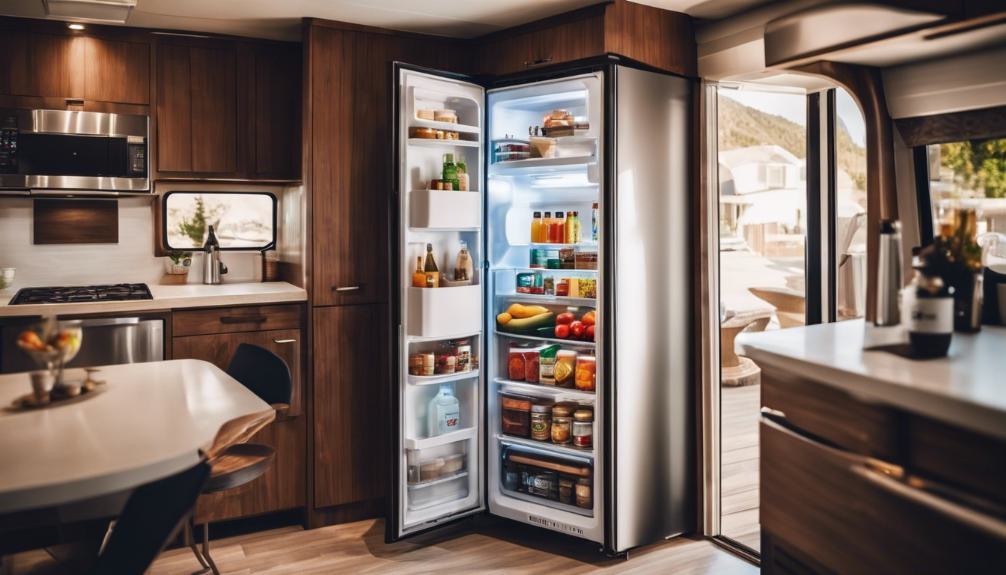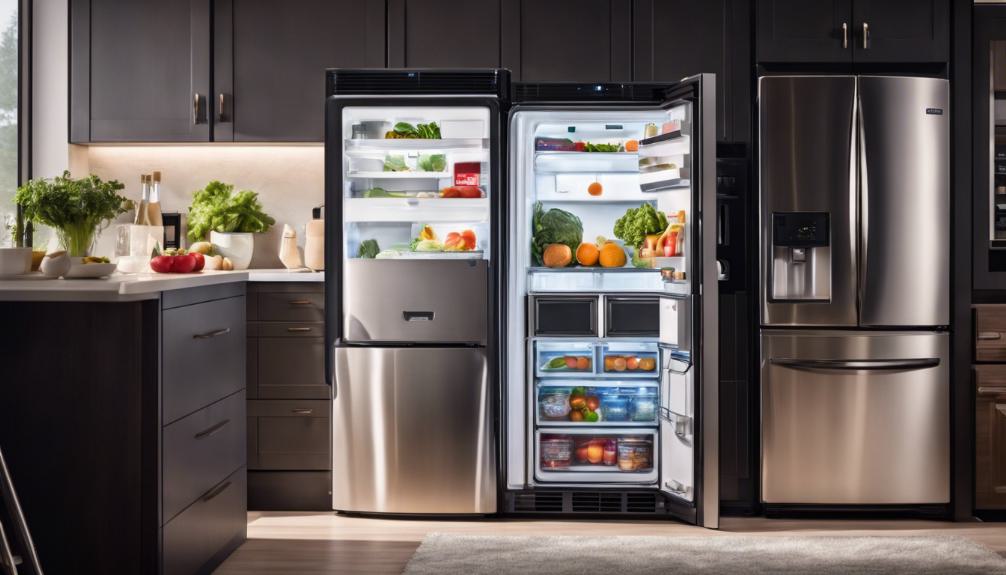Have you ever considered how your meals stay fresh while you’re steering through the twists and turns of the open road? An RV refrigerator, distinct from its household counterparts, is engineered to keep your food cold and safe under the unique conditions of travel. These units cater to the constant movement and power variability inherent in RV living, utilizing multiple power sources to guarantee efficiency. They’re not just compact; they’re built to endure. However, the intricacies of how these refrigerators work and the best practices for their maintenance are often overlooked. Let’s explore the mechanisms that keep your road trip snacks chilled and why understanding these can significantly enhance your mobile living experience.
What Are the Basics of RV Refrigerators?

The basics of an RV refrigerator are significant for anyone planning to travel or camp, ensuring the luxury of cold food and beverages at their fingertips. An RV fridge, unlike its residential counterpart, operates on a unique blend of power sources, including 12V power from the engine, 120V power from a campground hookup, or LP gas. This versatility guarantees that regardless of where you find yourself, you can maintain the safety and freshness of perishable foods and medications.
RV refrigerators are designed as absorption refrigerators, a detail that sets them apart from the typical compressor-based models found in homes. This distinction is important as it influences their efficiency and functionality in the mobile environment of an RV. The ability to switch between power sources based on availability and necessity is a game-changer for travelers seeking the convenience of modern life while on the move.
The benefits of having an RV fridge extend beyond simple food preservation. They eliminate the hassle associated with monitoring ice meltage in coolers, prevent the inconvenience of soggy food, and provide the pleasure of cold beverages and ice cream anytime, enhancing the overall travel or camping experience. By offering these conveniences, RV refrigerators embody the essence of bringing the comforts of home into the great outdoors.
How Do RV Refrigerators Work?
Absorption Cooling Principles
To grasp how RV refrigerators guarantee your food stays cold, it’s key to examine the absorption cooling principles upon which they operate. Unlike traditional refrigerators that use compressors and refrigerants, RV fridges rely on gas absorption for cooling. This system, powered by heating the cooling unit with propane or an electric element, involves no moving parts, greatly enhancing reliability. The process is intricate, requiring careful maintenance to function at its best. Diagnosing issues within this system can be complex due to its unique design. Understanding the role of propane in heating the cooling unit is important, as it kickstarts the absorption process, ensuring your fridge maintains the necessary temperatures to keep your food fresh and safe.
Power Source Options
After exploring how absorption cooling principles enable RV refrigerators to keep your food cold, let’s examine the various power source options these appliances utilize to function effectively. RV refrigerators can run on propane, 120V AC power from standard outlets, or 12V DC power stored in house batteries, offering versatile cooling solutions. Propane, a common choice for absorption refrigerators, necessitates external venting for heat dissipation. Meanwhile, inverters play an important role in converting DC to AC power, enabling the refrigerator to operate when not connected to shore power. Additionally, compressor refrigerators, which draw power directly from batteries, offer an alternative that doesn’t rely on propane for cooling, illustrating the broad range of power source options available for these essential appliances.
Temperature Control Mechanisms
Delving into how RV refrigerators maintain their cool, it’s essential to grasp the temperature control mechanisms that allow these units to function efficiently without the use of compressors. RV refrigerators operate by employing a gas absorption process. This unique method involves heating the cooling unit with either a propane or electric heating element. The absence of moving parts, like compressors found in traditional refrigerators, is a key feature. The gas absorption process facilitates cooling by circulating refrigerant through the system, driven by heat input, which can be precisely controlled to maintain desired temperatures. Proper maintenance is critical for this delicate balance to guarantee efficient functioning. Troubleshooting temperature control issues requires a deep understanding of this absorption cycle, given its complexity compared to compressor-based systems.
What Are the Types of RV Refrigerators?
Exploring the types of RV refrigerators reveals a diverse range of cooling solutions, each with its own set of advantages and considerations for your adventure on the road. When you’re deciding on the right fridge for your RV, you’ll primarily encounter two main types: absorption refrigerators and compressor refrigerators.
Absorption refrigerators are a common sight in RVs due to their versatility in power sources. They can run on LP gas, shore power, or DC power, making them highly adaptable to various camping situations. However, a critical point to remember is that these fridges need to be perfectly level to function correctly. This requirement might limit your parking options, especially in rugged terrains or when a perfectly flat surface isn’t available.
Compressor refrigerators, on the other hand, offer a more robust cooling system that cools down faster and runs efficiently on AC or DC power. Unlike absorption models, compressor fridges like those found in the Bowlus line, don’t need to be perfectly level to operate effectively. This feature provides more flexibility in where you can park and still have your refrigerator run without a hitch.
When considering your options, keep in mind:
- Absorption refrigerators require precise leveling to operate properly.
- Compressor refrigerators cool more quickly and efficiently, without the need for being level.
- Choosing the right type depends on your travel needs, power availability, and where you plan to take your RV.
Deciding between an absorption or compressor refrigerator will heavily impact your RV lifestyle, influencing everything from where you can park to how you manage your power resources.
What Are the Differences Between RV Fridge and Residential Fridge?

While both RV and residential refrigerators serve the fundamental purpose of keeping your food cold, they operate under substantially different principles and are designed for distinct environments. RV refrigerators, lacking compressors, utilize an absorption process for cooling. This contrasts sharply with residential refrigerators, which depend on compressors to maintain their cool temperatures. This fundamental difference in cooling technology reflects the unique requirements and limitations of each environment.
Residential refrigerators require a constant supply of 120V AC power, making them well-suited for homes where power supply is stable and uninterrupted. On the other hand, RV refrigerators boast a remarkable versatility in power sources. They can run on 12V DC power, propane, or shore power, catering to the varied needs of campers or travelers. This flexibility is particularly advantageous for off-grid use, where traditional power sources may be unavailable.
In addition, the size and design of these refrigerators are tailored to their intended use. RV refrigerators are generally smaller, with capacities ranging from 6-14 cubic feet, reflecting the space constraints within an RV. Additionally, they are built to withstand the vibrations and movements inherent in travel, featuring specific adaptations such as latches for secure door closure.
In contrast, residential refrigerators offer larger storage capacities but lack the features necessary for safe travel. They are not designed to handle the constant movement or to operate efficiently on alternative power sources, making them unsuitable for the dynamic environment of an RV.
Understanding these distinctions is important for selecting the appropriate refrigerator for your needs, whether you’re outfitting a home or gearing up for travel.
What Are Some Maintenance Tips for RV Refrigerators?
To guarantee your RV refrigerator remains in top condition, adopting a regular cleaning routine is essential. This involves not only wiping down surfaces but also monitoring the temperature to prevent fluctuations that could affect your food’s freshness. By focusing on these practices, you’re taking essential steps toward maintaining efficiency and extending the lifespan of your appliance.
Regular Cleaning Routine
Maintaining your RV refrigerator’s efficiency and freshness involves adopting a regular cleaning routine that includes several key steps. This not only guarantees that your food remains safe and fresh but also preserves the peak performance of your RV refrigerator. Regular cleaning is essential to maintaining the best performance of the appliance, particularly paying close attention to the condenser coils.
- Wipe down shelves, drawers, and interior surfaces with a mild detergent and water solution to keep the interior clean and free from food spills and residues.
- Vacuum or dust the condenser coils to make sure cooling efficiency is not compromised by dust accumulation.
- Clean the door gaskets with warm, soapy water to maintain a proper seal, preventing air leaks that could impact the refrigerator’s efficiency.
Adhering to these practices will keep your RV refrigerator running smoothly.
Temperature Monitoring Essentials
Ensuring your RV refrigerator operates below 40°F is important for preventing food spoilage and ensuring best performance. Use a thermometer for accurate temperature monitoring. This not only guarantees food safety but also enhances your fridge’s efficiency and longevity. Avoiding frequent door openings helps maintain stable temperatures, preserving the coolness inside. Regularly adjusting your thermostat settings is vital to keep the fridge at the desired temperature, catering to the needs of your stored items and external temperature changes.
| Strategy | Benefit | Implementation |
|---|---|---|
| Use a thermometer | Accurate temperature check | Daily checks |
| Limit door openings | Stable temperature | Plan fridge access |
| Adjust thermostat | Desired temperature | As needed |
Proper temperature monitoring is an essential maintenance tip that prolongs your RV fridge’s life and ensures energy efficiency.
How Can You Upgrade Your RV Refrigerator?

Upgrading your RV refrigerator can greatly enhance your travel experience by offering increased storage and improved cooling efficiency. When considering an upgrade, it’s essential to evaluate several factors to make the most informed decision. The type of refrigerator, compatibility with your RV’s power source, and the dimensions of your available space are critical considerations.
- Power Source Compatibility: Your RV’s power source plays a significant role in determining the type of refrigerator you can install. Whether your RV runs on electricity, propane, or a combination of both, make sure the new refrigerator is compatible. An incompatible power source can lead to inefficient operation or even damage to the appliance.
- Size Constraints and Installation Requirements: Measure the available space carefully before selecting a new refrigerator. Upgrading to a residential-style refrigerator might offer more storage, but it could require modifications to your RV for a proper fit. Additionally, consider the installation requirements, such as ventilation and electrical connections, to make your upgrade process smooth.
- Advanced Features for Enhanced Experience: Modern RV refrigerators come equipped with features like digital temperature control and energy-efficient operation. These advancements can not only improve the efficiency of your refrigerator but also contribute to a more enjoyable and manageable travel experience.
Consulting with RV experts or manufacturers can provide valuable insights into the best upgrade options for your specific needs and travel habits. By carefully considering these factors, you can greatly enhance your RV living experience with a refrigerator upgrade that suits your lifestyle.
Frequently Asked Questions
What’s the Difference Between an RV Refrigerator and a Regular Refrigerator?
You’re asking about the difference between an RV refrigerator and a regular one. RV refrigerators are smaller, use absorption cooling, and can run on propane or DC power, unlike regular refrigerators that need constant AC power.
How Does the Refrigerator Work in an Rv?
Your RV’s refrigerator works by heating a cooling unit with propane or an electric element, utilizing a gas absorption process, which doesn’t require moving parts, making it less prone to mechanical failures. Regular maintenance is essential.
What Are the Two Types of RV Refrigerators?
You’re looking at two main types of RV refrigerators: absorption refrigerators, which can run on multiple power sources, and compressor refrigerators, known for their efficiency and quick cooling. Each has its unique benefits for RV life.
Do RV Refrigerators Run Continuously?
No, RV refrigerators don’t run continuously. They cycle on and off to maintain the desired temperature, controlled by a thermostat. This cycling depends on the ambient temperature, food quantity, and door opening frequency.
Conclusion
To sum up, understanding your RV refrigerator is key to enhancing your travel experience. By grasping how it operates, the types available, and the differences from residential fridges, you’re better equipped to maintain and possibly upgrade it. Regular maintenance guarantees longevity and efficiency during your adventures. Whether you’re considering an upgrade or just aiming to keep your current fridge in top shape, being informed and proactive is critical. After all, a well-functioning RV refrigerator is central to the comfort and convenience of your travels.

